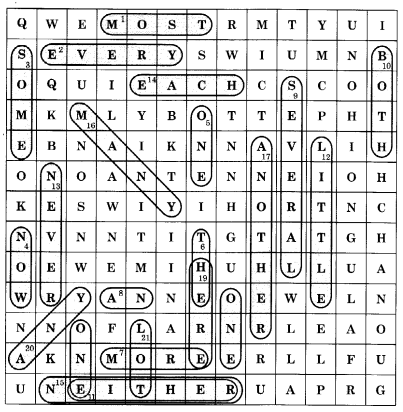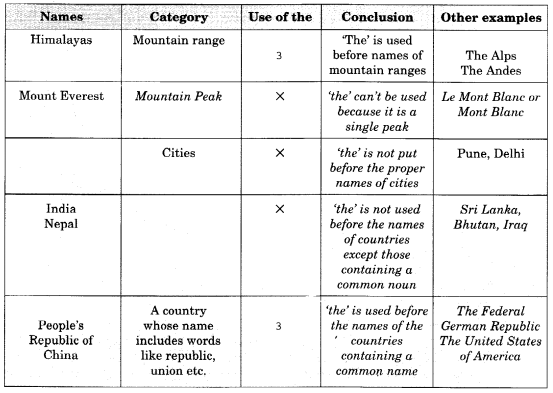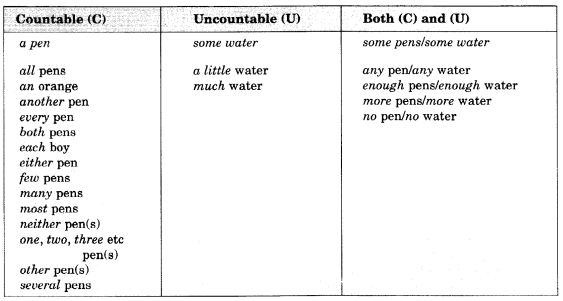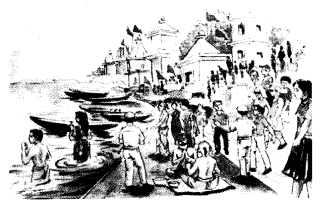English Workbook Class 10 Solutions Unit 1 Determiners
Introduction
In this unit you will use the words which help to identify things - to say whether they are known or unknown to the listener, which one(s) the speaker is talking about, whether the speaker is thinking of specific examples or talking in general. You will also work with words which say how much or how many
There are twenty determiners in the grid given below. Encircle these determiners
 ans:
ans:
- most
- every
- some
- now
- one
- the
- more
- an
- several
- both
- either
- little
- never
- each
- neither
- many
- another
- there
- here
- any
- lot
Articles
- The building that I visited today is a museum
- A building in which antiques are kept is called a museum
The word used before building in -
Sentence 1 is specific and in
Sentence 2 is non-specific
Can you think of a reason why different words are used before building in these two sentences ?
(Clue : Remember what you read in Class IX about specific and non-specific items.)
Building in sentence 1 is specific because it is the one I visited.
Building in sentence 2 is non-specific because it is like other buildings
Working in pairs, decide which of the items in italics are definite (or specific) and which are indefinite (or non-specific)
Then complete the following sentences using appropriate articles
- Bangkok is _______ capital of Thailand
- Australia, _______ country in the southern Hemisphere, has produced some world- class sportspersons
- _______ fruit seller does not earn much during the rainy season
- _______ girl who lives at the corner of our street has been selected for the civil services
- Many countries rely on _______ type of cocoa produced in Ghana for their chocolate products
- The Amazon is considered to be _______ largest river in the world, in terms of volume of water
- _______ Punjab, _______ important state of North India, has five rivers flowing through it
- 1950 is _______ year in which India became a republic
ans:
- the - Definite (specific)
- a - Indefinite (non-specific)
- A - Indefinite (non-specific)
- The - Definite (specific)
- the - Definite (specific)
- the - Definite (specific)
- The, an - Definite (specific), Indefinite (non-specific)
- the - Definite (specific)
Read this extract from a story. Fill in the blanks using a, an or the where necessary
Note : The answers are shown in italics and are underlined
I drove on the Time Machine without changing the lever. At last I stopped ; the sun was red and very large and a huge reddish rock was there. The Time Machine, in which I sat, was standing on a sloping beach and I saw a sea stretch to the horizon, but without any waves. No breath of wind stirred and I began to breathe very fast and felt an oppression in my head. I heard a harsh scream and saw a thing like a huge butterfly. But as I turned to look around again, I froze. A reddish mass of rock was moving towards me. I realized that it was a monstrous crablike creature. I felt a tickle on my cheek, as though a fly had lighted there. I struck at this and caught something threadlike
With horror I realized that I had just grasped the antenna of a monster crab. In a moment I had pulled the lever. I placed the time of one month between myself and these monsters.
Ref.: The Time Machine
By H.G. Wells
In groups of four, read the following description from a geography book, and underline the geographical names
Note : The geographic names are shown in italics and are underlined
The Himalayas. the highest mountain range in the world, protect India from the cold winds blowing from central Asia and the People Republic of China. Mount Everest, the highest mountain peak of the world belongs to this range and is situated in Nepal. To the south ,of the Himalayas, the great northern plains extend between the mouth of the rivers Indus and the Ganga. The Indus, the Ganga and the Brahmaputra start in the Himalayas. The Indus starts in Tibet near Mansarovar Lake. The Ganga rises in the Himalayas and the Brahmaputra, also known as Tsana Po. starts in Tibet. The Ganga and the Brahmaputra join together before flowing into the Bay of Bengal. Between the fertile Indus and Ganga plains are the Aravalli Hills and the Thar Desert
Now discuss within your groups how the article is used (or not used) before geographical terms, and complete the following table


You and your friend have been asked to help the quiz-master to prepare questions for a geography quiz in your school. You may choose topics from the list below to prepare your questions

Work in pairs. Each pair should write at least five questions (and answers), e.g.
What do you cross, when travelling from Europe to the USA ?
(The Atlantic Ocean)
You may use an atlas. Remember what you have learned in B.4 about using or not using the
- Which is the largest continent in the world
- Which is the longest mountain range between India and the People Republic of China
- What do you cross when travelling from India to Sri Lanka
- What river flows through London
- What is the famous lake known as in Geneva
- What do you cross when travelling from India to Oman
- Which canal do you cross when travelling from the Red Sea to the Mediterranean Sea
ans:
- Asia
- The Himalayas
- The Palk Strait
- The Thames
- Lake Geneva
- The Arabian Sea
- Suez Canal
Determiners with countable and uncountable nouns
Add a suitable noun to each of the following determiners in the box below


Now get into groups of four, compare your answers, and decide which of the determiners can be used with
_____ countable nouns only
_____ uncountable nouns only
_____ both countable and uncountable nouns
Fill in the table below as you do this activity

ans:The following determiners can be used with countable nouns only :
a, all, an, another, every, both, each, either, two few, many, several, most, neither, no, any, one
The following determiners can be used with uncountable nouns only
enough, little, more, a lot of, some, much
The following determiners can be used with both countable and uncountable nouns :
all, some, most, more, a lot of, enough, no, any
"

Given below is a picture of a beautiful scene you saw on your trip to Varanasi, Uttar Pradesh. Write an e-mail to your friend Harsh, in Bangalore, describing the scene
To help you write your mail, first match the determiners in the box with items from the picture. (X indicates that the word does not require a determiner.) Apart from the determiners given in the box, you can also use other suitable determiners

two, three (etc), an, a, the, several, many, very little, every, each, X

Date : 18th July, 20 - -
From : rajul3@gmail.com
Sub : Trip to Varanasi, Uttar Pradesh
To : harsh 10@gmail .com
Dear Harsh
I hope everything is fine at your end. In this e-mail I am describing my visit to Varanasi, Uttar Pradesh
I visited this religious centre last week with my parents. The place, the ghats at the river Ganga have a religious fervour. There flutter a lot of prayer flags. Several ghats have long steps where pilgrims bathe or dip in the holy river. The river Ganga flows majestically here touching the several mango groves and buildings. There is a big crowd of ascetics who sit scattered here and there on the ghats. They add a religious aura to the place. At the same time, hundreds of thousands devotees throng these ghats to dip in the Ganga when there are religious festivals like Kumbh. There is then a full team of security officials supervising the place and other things
The place has a strange charm of its own. Even a non-believer can be influenced by the faith of the people and the religious fervour of the place. Several foreign tourists can be spotted wearing ochre turbans and dresses. The scene at Varanasi, thus, is a thing to memorize. It is always pleasure-giving. Do find time to visit it
With best wishes
Regards : Yours sincerely
Raju
Determiners - Summary
Kishore stayed with a family during his holiday. As Kishore, write a letter to your parents using the information given below. You will also have to use appropriate determiners in your letter
See the Workbook on Pages 7 and 8
ans:816, C-block
Gurgaon
Haryana
13 February 20 - -
Dear Mom and Dad
I am having a good time here with the Awasthis. They are a nice small family. Mr. Karan Awasthi is 26 and works as a hotel manager in a five star hotel. He was recently married and lives in Gurgaon. His lovely wife, Nayantara, is a fashion designer. She did her postgraduate degree from Delhi University, Delhi
Both husband and wife have some common interests. Due to this, they seem to be made for each other. Both like reading and listening to music. Karan likes to travel so does Nayantara. Both of them are ambitious persons and want to do something great in life. They are not happy with the present house and plan to move. They have seen a few houses. But they have not yet decided which house to buy. They are planning holidays in Ranikhet and Ramgarh
I have learnt a lot from the Awasthis which shall benefit me greatly in life. I find that their outlook towards life is very clear. They want to enjoy life to the maximum within the cultural values of the society
Yours affectionately
Kishore
The following paragraph has not been edited. (There is one error or omission in each line). The errors have been underlined and the omissions marked with a 7 Write your corrections in the space provided. The first correction has been done as an example
The area of / Atlantic Ocean south of Florida - the
has been an tricky one for travellers - a
In the days of sail, ships crossing / area - the
often found themselves becalmed for / periods - some
To save drinking water, more horses on board - many
would be thrown into / sea - the
Nevertheless, any sailors died of thirst - many
One of / unique sea-going mysteries ever - the
an 103-foot sailing ship was found floating - a
abandoned with the life-boat missing - a
In the last 100 years much than 50 ships - more
and 20 aeroplanes have disappeared in the Bermuda triangle - or
Read the dialogue and fill in the blanks by using words which will help to make the meaning clear
- _____ two chairs look so shabby. Dont you think we need to get a
- _____ uf new ones?
B. Well talk about it a
- ______ later, I have
- ______ important piece of work to complete tonight. I cant spare
- time right now.
T saw
- _____ exquisite chairs at WOODCRAFT. I think they would fit beautifully in
- ________ drawing-room
WOODCRAFT ! It is - most expensive show-room in town!
But they have authentic teak furniture, or we could choose
- ______ set of chairs in rosewnod ;
- ______ idea may be to buy some cane chairs
B. I guess it would be useful to spend a - _____ more on furniture which would last for
- ______ years.
So, when can you spare a
- hours to visit WOODCRAFT with me?
We could go
- _____ Saturday or Sunday
ans:
- These
- set
- little
- an
- any
- some
- the
- the
- a
- the
- little
- many
- few
- next
Choose the appropriate option from the box to complete the given sentences
- 1 have been to ______ [a / the] doctor, whose name appeared in the New York Times
- I had left ______ [the/ my] green shirt on the bed, but I cant find it now
- Is there ______ [the / a] fitness centre near your house
- ______ [one / few / an] example helps understand concepts better
- ______ [India / India] cultural diversity attracts tourists from all over the world
- That house at the corner of the street belongs to ______ [many / those] people who are standing near its gate
- He has hardly read ______ [many / any] book
- He drove with ______ [much / little] care and hence was fined by the traffic police
- ______ [little / a little] milk is required for a cup of tea
- ______ [few / sume] of the mango trees in their garden bear fruit twice a year
- ______ [any /each] student of this class is a scholar badge holder
- My ______ [another / other] sister is taller than me
- The ______ [many / three] monkeys that escaped from the Delhi zoo were found eating bananas in a fruit shop
- I spent ______ [the little / a little] money I had
- You may have ______ either / any of the four watches
ans:
- the
- my
- a
- An
- Indias
- those
- any
- little
- A little
- Some
- Each
- other
- threv
- the little
- any